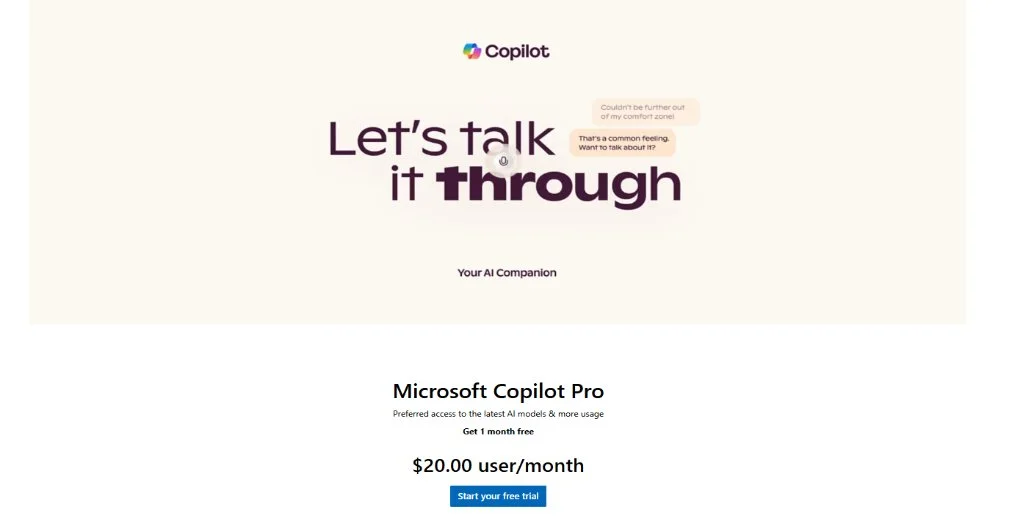Microsoft Copilot Pricing
Join thousands of enterprises in optimizing your Microsoft pricing strategy for maximum savings and performance
Microsoft Copilot Pricing & Costs: What Should Your Enterprise Be Paying?
Microsoft Copilot Pricing is one of the most widely adopted enterprise-grade licensing options, but its pricing isn't as straightforward as many IT leaders expect. While Microsoft provides a publicly listed price, the actual cost enterprises pay can vary significantly based on contract size, industry, growth rate, and negotiation strategy.
Understanding Microsoft's pricing structure is essential for IT decision-makers looking to optimize their software budgets. In this article, we'll break down the standard Microsoft Copilot Pricing, explain how enterprise rates are determined, and explore strategies to ensure you're getting the best deal.
Need expert guidance? Our Contract Negotiation services help enterprises secure the best possible pricing. Learn more here.
What Is the Microsoft Copilot Pricing?
Microsoft Copilot assists users in enhancing productivity and creativity by automating repetitive tasks across Microsoft Office applications, integrating seamlessly with tools like Word, Excel, and Outlook.
Key Features of Microsoft Copilot:
- AI-Powered Text Generation
- Smart Data Insights in Excel
- Automated Email Summaries in Outlook
- Seamless Integration Across Microsoft 365
- Real-time Collaboration Features
- Customizable Workflows
How Much Does a Microsoft Copilot Cost?
Microsoft's Publicly Listed Price
According to Microsoft's official pricing page, the standard cost for a Microsoft Copilot is:
$30 per user, per month (as of 2025-04-01)
(Note: Microsoft updates its pricing periodically, so it's crucial to check their latest rates.)
However, this price is not what most large enterprises actually pay due to volume discounts, contract negotiations, and bundled agreements.
Want to benchmark your pricing? Get expert insights on licensing.
What Are Enterprise Rates for Microsoft Copilot?
Many enterprises pay significantly less than the publicly listed price. But how much should you expect to pay? The answer depends on several factors:
Factors That Influence Microsoft Copilot Enterprise Pricing:
- Contract Size & Seat Volume: Larger organizations can negotiate discounts based on the number of users.
- Industry-Specific Pricing: Some industries (government, education, healthcare) have special pricing structures.
- Microsoft Relationship & Negotiation History: Enterprises that have strong, long-term relationships with Microsoft often receive better pricing.
- Bundled Agreements & Add-Ons: Licensing alongside other services can affect pricing.
Enterprises that negotiate strategically can reduce their per-user costs by 10–30% or more compared to the list price.
Is your enterprise overpaying? Let's evaluate your contract.
Can You Negotiate a Better Price for Microsoft Copilot?
Yes. Most enterprises do. Microsoft expects large customers to negotiate, and their sales teams have pricing flexibility to accommodate high-value contracts.
How Enterprises Secure Lower Microsoft Copilot Pricing:
- Benchmarking Against Similar Companies – Understanding what others in your industry pay gives you leverage.
- Strategic Renewal Timing – Timing your renewal with Microsoft's quarterly sales cycles can unlock discounts.
- Bundling Licenses & Services – Combining with other services can improve overall pricing.
Negotiation isn't just about price—it's also about contract terms, flexibility, and additional benefits like support and training.
Need help negotiating? Our experts specialize in contract negotiations. Contact us here.
Common Pricing Mistakes Enterprises Make
Top Mistakes to Avoid:
- Assuming List Price is Fixed – Microsoft's public pricing is a starting point, not a final offer.
- Not Benchmarking Against Similar Companies – Without industry insights, enterprises often miss out on discounts.
- Ignoring Contract Timing – Renewing at the wrong time can result in higher costs.
- Underutilizing Features – Many companies pay for features they don't need, leading to wasted spending.
Want a pricing audit? Let's analyze your contract.
How to Determine What Your Enterprise Should Be Paying
If you're unsure whether your Microsoft Copilot pricing is competitive, follow these steps:
1. Conduct an Internal Usage Audit
- Are all features being used?
- Could you downgrade some licenses to save money?
2. Compare Pricing Across Similar Organizations
- Seek benchmark data to see what others in your industry pay.
3. Work With a Contract Specialist
- Experts can uncover hidden savings and improve contract terms.
Want a custom pricing analysis? Get in touch with our licensing experts.
Final Thoughts: Are You Overpaying for Microsoft Copilot?
Microsoft's list pricing doesn't tell the whole story. The actual cost enterprises pay varies based on contract size, industry, and negotiation tactics.
To ensure your organization is getting the best deal:
- Benchmark your pricing against similar companies.
- Avoid common contract negotiation mistakes.
- Leverage expert insights to optimize your licensing strategy.
Don't leave money on the table. Schedule a contract review today.

